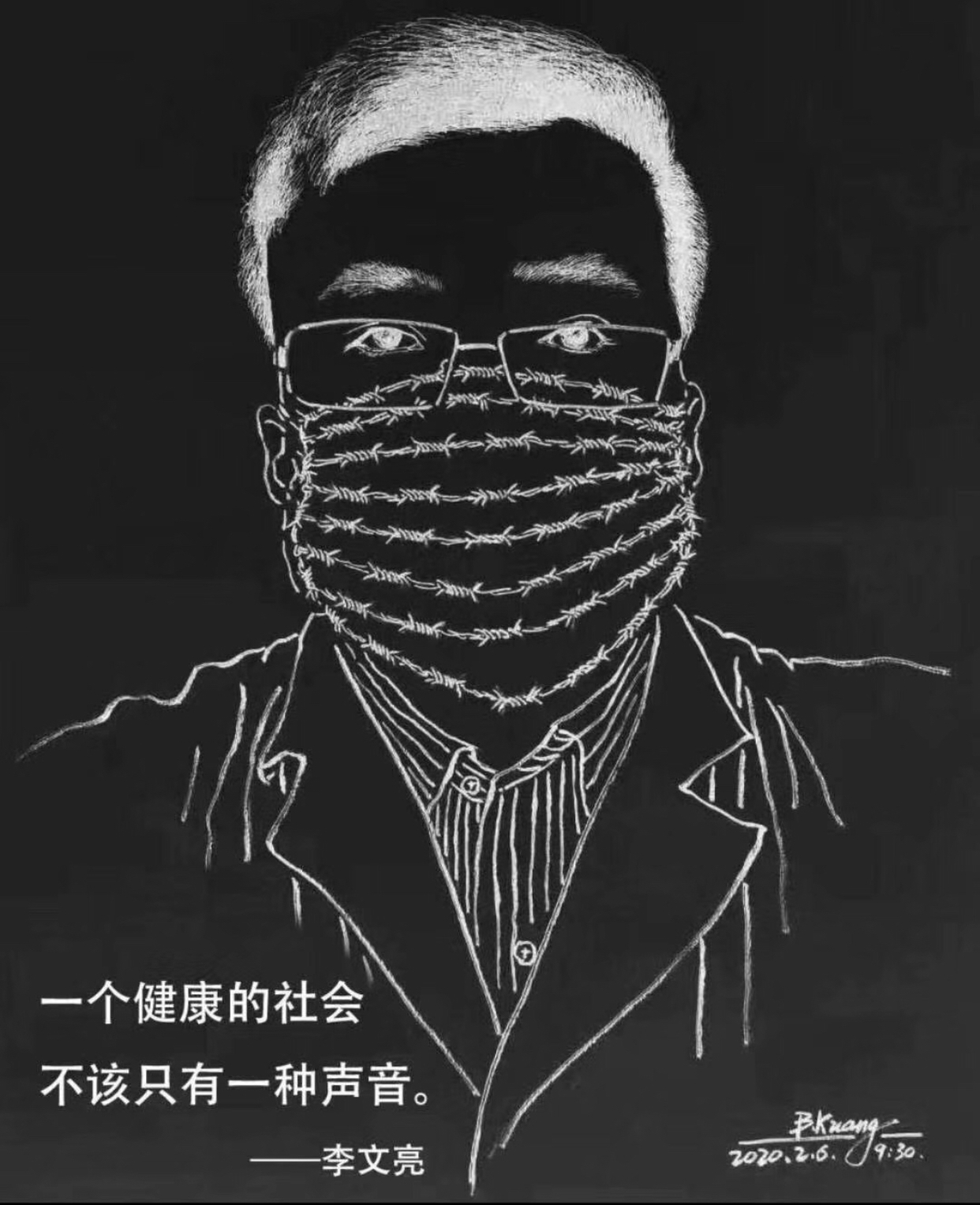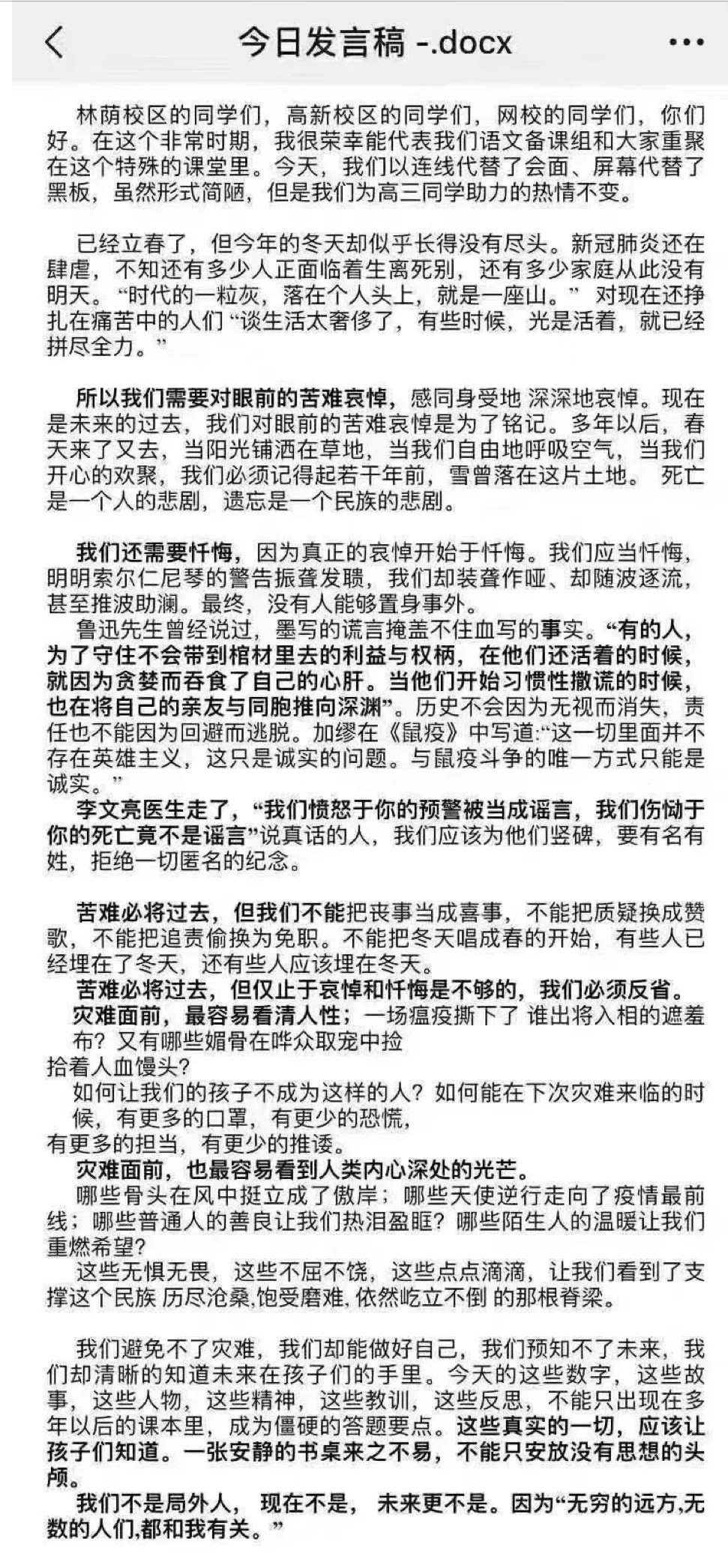The following remarks were addressed to senior high school students by a Chinese Language teacher at the Linyin Campus of High School No.7 in Chengdu, Sichuan province 四川成都七中林蔭校區 as schools opened in the second week of February after an extended Spring Festival holiday occasioned by the outbreak of the coronavirus (2019 novel coronavirus or 2019-nCoV) in Wuhan, the capital of Hubei province.
The text of the speech was posted online on 10 February and widely circulated before being ‘scrubbed’ from the mainland Chinese Internet by intellectual hygiene workers.
— Geremie R. Barmé
Editor, China Heritage
12 February 2020
***
Further Reading:
- Josh Rudolph, ‘Recommendations for Handling Netizen Reaction to Li Wenliang’s Death‘, China Digital Times, 7 February 2020
- 許章潤,《憤怒的人民已不再恐惧》, Matters, 2020年2月4日
- Xu Zhangrun, ‘Viral Alarm: When Fury Overcomes Fear‘, trans. GR Barmé, ChinaFile, 10 February 2020
- Various, ‘A Writer’s Desk & the Vastness of China — 1989, 2019’, China Heritage, 4 June 2019
- Geremie R. Barmé, Silent China & Its Enemies — Watching China Watching (XXX), China Heritage, 13 July 2018
- Evan Osnos, ‘China’s “Iron House”: Struggling Over Silence in the Coronavirus Epidemic‘, The New Yorker, 12 February 2020
***

The refusal of one decent man
outweighs the acquiescence of the multitude.
千人之諾諾,不如一士之諤諤。
— Sima Qian, ‘Biography of Lord Shang’
司馬遷, 《史記 · 商君列傳》
Lessons To Be Learned
A Teacher in Chengdu
Translated by Geremie R. Barmé
Good Morning, Everyone!
I am honoured to have this opportunity to address you today on behalf of our Language Program during what is an extraordinary time in our communal lives. We are gathering together once more but in a special classroom for, today, we are meeting via online video conference rather than face-to-face. The screen has replaced the usual blackboard and, although our equipment is basic, the enthusiastic support of our senior students is as reassuring as ever.
According to the traditional lunar calendar we have entered the annual phase of what is called Spring Established [marked on 4 February], though I have to admit that this year it feels as though the winter will never really end. The Nova coronavirus continues its rampage and none of us know how many of our fellows are facing the agonies of illness and possible heartbreak of death. Nor do we know today how many families will never enjoy a tomorrow.
‘When only a single ash in an age of conflagration alights on the head of a single person it feels as though the whole weight of a mountain is bearing down on them.’ [This is a quotation from Fang Fang, the pen name of Wang Fang, a well-known writer based in Wuhan, Hubei province, the epicentre of the outbreak of the coronavirus. See: 方方, ‘時代的一粒灰,落在個人頭上,就是一座山‘, 10 February 2020]
To talk about normal life in the presence of people tormented by the present struggle is the worst kind of indulgence. We realise that, sometimes, it takes every fibre of our being simply to keep on living.
That’s why we need to mourn: We need to mourn these present sufferings; we need to mourn in empathy.
We should be mindful that the present moment will, in the future, become the past. But the reason that we are mourning the present is because of the need to remember. Many years from now, the spring season will come and go as usual and, when the sunlight sheds warmth over the grass, whenever we take a free breath of that mild air, or when we gather together in happiness and joy, we must remember, remember that in years past this land was covered at this time in a chill blanket of snow. Death is a tragedy visited on everyone; forgetfulness is the tragedy of a nation.
This is also a time to reflect and repent, for true mourning starts with the act of repentance. Alexandr Solzhenitsyn’s warning [in which he quoted the old Russian proverb: ‘Dwell on the past and you’ll lose an eye. Forget the past and you’ll lose both eyes’] remains as deafeningly powerful today as ever, but people still turn a deaf ear to it. We give ourselves up simply to go with the tide, we may even add our energies to increase the swell. In the final analysis, however, no one is above the fray. As Lu Xun said:
‘Lies written in ink can’t hide truths recorded in blood.’
I would also note:
‘Some people strain in their efforts to hold onto worldly wealth and power although they know full well they can’t take it to the grave. To that greedy end they devour their own hearts and conscience. As the lies come easier and faster, they are even will to cast family, friends, as well as compatriots, into the yawning chasm.’
History will not disappear simply because you chose to ignore it; nor can you slough off responsibility simply by avoiding things. In his novel The Plague Albert Camus wrote:
‘There’s no question of heroism in all this. It’s a matter of common decency. That’s an idea which may make some people smile, but the only means of fighting a plague is — common decency.’
Dr Li Wenliang has left us. [Note: Li Wenliang was an ophthalmologist at Wuhan Central Hospital who expressed his concerns that a new virus — now named COVID-19 — was spreading in the city. He wrote about his fears in a WeChat group he shared with colleagues on 30 December 2019. His fears were subsequently shared publicly much to the consternation of the authorities. The police forced him to confess to ‘making false comments on the Internet’. Back at work he contracted the virus from an infected patient and died on 7 February 2020.]
‘We are outraged that your warnings were treated as “rumour-mongering” just as we are heartbroken that news of your passing is no rumour.’
We should erect monuments to commemorate those who dare to speak the truth. Such monuments must be engraved with their names in full. We must reject all commemorations that ignore the names of the real heroes.
Inevitably, these present agonies will pass; but we must not treat this funereal reality as though it is something that can also be celebrated; we cannot drown out our doubts by raising our voices in praiseful song; we cannot allow dismissals to suffice when what is required is a proportioning of guilt.
Inevitably, these present agonies will pass; but we must not be satisfied only with mourning and confession, for we must also give ourselves over to heart-felt reflection.
Human nature reveals itself most readily when people are confronted with disaster. During a viral plague the fig leaf of shame is stripped away and we can see exactly who is truly capable of leading. We see too those fawning individuals who strive to garner the plaudits of the masses while actually feeding off the blood of the victims.
What can we do to ensure that our own children do not turn into people like that? How can we be sure that the next time there is a disaster like this that there will be enough face masks to go around; that there will be less public panic; that more people will take responsibility; that fewer people will try to slack off?
Yet, when confronted by disaster the brilliant light buried deeply in the human heart also shines through.
Who are they who are strong and resolute enough to weather this storm? Who are those extraordinary angels who, going against the tide of fear, take up the battle on the front lines? Who are the ordinary men and women whose decency brings tears to our eyes? Who are the strangers whose warmth rekindles hope in our hearts?
These acts of bravery and courage; these indomitable spirits; this myriad of quotidian acts — they all bolster our nation, for ours is a land that has experienced so very much over so many years. It is a nation that has had its fill of suffering and tragedy; it is a nation, however, that still has a strong backbone, one that will not bend in defeat.
There is nothing we can do to avoid disaster. What we can do is to be the best people that we can. Nor is there any way we can predict the future, although let there be no doubt: the future is in the hands of the young people of today.
Everything that we are hearing about right now — all of the statistics; the stories; the individuals; the uplifting spirits; the lessons learned; as well as reflections such as this — this cannot be left merely to be recorded in the textbooks of the future. Let’s not turn them into the lifeless answers to rote questions posed in some exam paper.
This reality — all of this reality — is something that we must share with the young. We need to teach you how hard a struggle it is to ensure that you have a safe and quiet place to study [Note: this is a reference to a famous line about ‘finding a place for a scholar’s desk’. See: ‘A Writer’s Desk & the Vastness of China — 1989, 2019’]. There must be a place for a desk where you can study; however, there should be no room for mindless and heedless attitudes.
We are not outsiders to all that is going on around us; we are not outsiders now, nor will we be outsiders in the future. The reason for this is that [as Lu Xun wrote shortly before he died]:
‘…all that infinite space, those countless people out there — they are linked in some way with me.’
***

***
Source:
https://chinadigitaltimes.net/chinese/2020/02/芝麻升学|成都七中老师开课致辞:不能把冬天唱/

